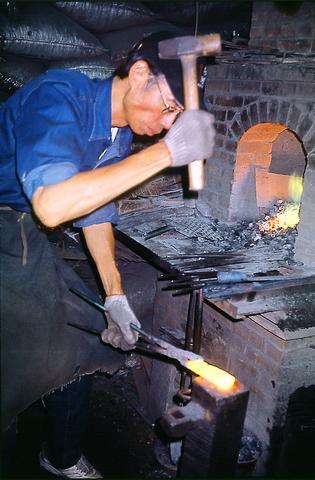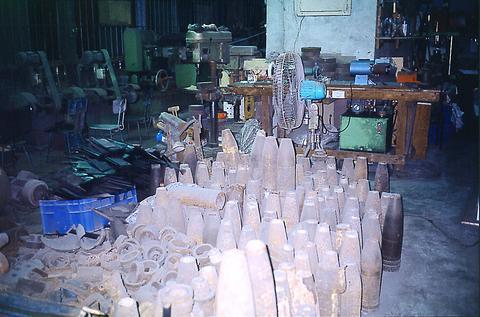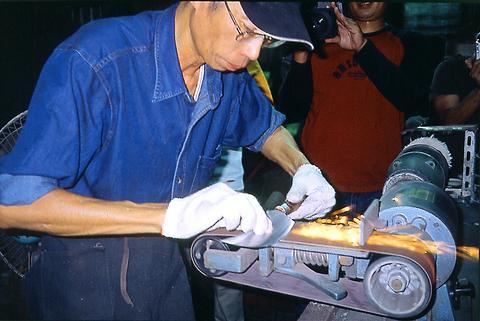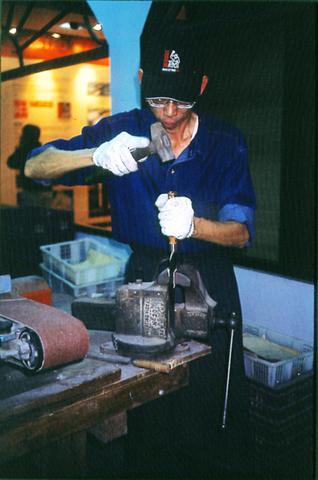In the 823 Artillery Bombardment (
What this has given Kinmen, in addition to many semi-collapsed buildings, is a huge cache of high-quality steel. In the hands of knife-maker Wu Tseng-dong (

PHOTOS: IAN BARTHOLOMEW, TAIPEI TIMES
The Chin Ho Li Steel Knife Factory (

Wu Tsong-shan, a quietly spoken bespectacled man, has spent over 30 years making knives and is the third generation of his family in the business. Wu recalled a childhood in which he would work the bellows of the forge when he got back from school, and serve as an assistant to his father and brothers around the smithy.
"In those days, production was very limited," he said. "But the knives we made were highly regarded, and would often be bought by soldiers stationed on the island and taken back to Taiwan. That's how our reputation grew."

In the early days, Wu's family made agricultural implements. Bombing of the island provided quality steel that literally dropped from the sky, and the Wu family shifted to making knives.

"Mostly we made butcher's knives. In the beginning, we would only take money after a person had used the knife and found it satisfactory. If it was unsatisfactory, we would replace it with another."
This input by Kinmen's butchers has been put to good use and now Wu's knives are definitely at the top end of the market. Sadly, perhaps, they are no longer used by local butchers, but have instead found their way into the kitchens of chefs working for major hotels in Taiwan and overseas. "Some have even provided specific designs for us," Wu said, "and we are gaining experience of their habits and needs."
While Wu does not claim any analytical knowledge of the materials he uses, his long familiarity with his materials has made him an expert in the subtle art of forging steel. "We must judge the heat of the steel very accurately. The color [of the red hot] steel tells us what we need to know ... this is part of the secret knowledge of our business," he said, with a mixture of pride and self-deprecation. "It all has to be judged very accurately."
Certainly, part of the appeal of Kinmen knives is in their association with history, but they would certainly not be so popular if they were not also of outstanding quality. The secret is in the fact that these knives are still forged and shaped by hand. "There is no comparison with mass-produced knives that are simply cut and ground from a metal board," he said. "It is the forging process that gives these knives their hardness and their ability to hold an edge."
The government has played a part in raising the profile of Kinmen knives. Since 1998 it has provided guidance about designing Western style knives and in 2000 assisted with a total revamp of labeling and packaging.
These days, "Maestro Wu" knives come in elegant display boxes and Wu says that they are increasingly developing extra-high-end knives for collectors.
"After all, one kitchen only needs a few knives, and our knives last a long time, so we have to expand the market in new directions."

Taiwan has next to no political engagement in Myanmar, either with the ruling military junta nor the dozens of armed groups who’ve in the last five years taken over around two-thirds of the nation’s territory in a sprawling, patchwork civil war. But early last month, the leader of one relatively minor Burmese revolutionary faction, General Nerdah Bomya, who is also an alleged war criminal, made a low key visit to Taipei, where he met with a member of President William Lai’s (賴清德) staff, a retired Taiwanese military official and several academics. “I feel like Taiwan is a good example of

March 2 to March 8 Gunfire rang out along the shore of the frontline island of Lieyu (烈嶼) on a foggy afternoon on March 7, 1987. By the time it was over, about 20 unarmed Vietnamese refugees — men, women, elderly and children — were dead. They were hastily buried, followed by decades of silence. Months later, opposition politicians and journalists tried to uncover what had happened, but conflicting accounts only deepened the confusion. One version suggested that government troops had mistakenly killed their own operatives attempting to return home from Vietnam. The military maintained that the

Jacques Poissant’s suffering stopped the day he asked his daughter if it would be “cowardly to ask to be helped to die.” The retired Canadian insurance adviser was 93, and “was wasting away” after a long battle with prostate cancer. “He no longer had any zest for life,” Josee Poissant said. Last year her mother made the same choice at 96 when she realized she would not be getting out of hospital. She died surrounded by her children and their partners listening to the music she loved. “She was at peace. She sang until she went to sleep.” Josee Poissant remembers it as a beautiful

Before the last section of the round-the-island railway was electrified, one old blue train still chugged back and forth between Pingtung County’s Fangliao (枋寮) and Taitung (台東) stations once a day. It was so slow, was so hot (it had no air conditioning) and covered such a short distance, that the low fare still failed to attract many riders. This relic of the past was finally retired when the South Link Line was fully electrified on Dec. 23, 2020. A wave of nostalgia surrounded the termination of the Ordinary Train service, as these train carriages had been in use for decades